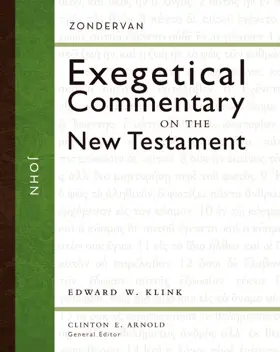

John
in Zondervan Exegetical Commentary on the New Testament
Pages
784
Publisher
Zondervan
Published
12/6/2016
ISBN-13
9780310243601
This series is designed for those who know biblical languages. It is written primarily for the pastor and Bible teacher, not for the scholar. That is, the aim is not to review and offer a critique of every possible interpretation that has ever been given to a passage, but to exegete each passage of Scripture succinctly in its grammatical and historical context. Each passage is interpreted in the light of its biblical setting, with a view to grammatical detail, literary context, flow of biblical argument, and historical setting. While the focus will not be on application, it is expected that the authors will offer suggestions as to the direction in which application can flow.
Collections
This book appears in the following featured collections.
- Basic Library Booklist by Detroit Baptist Theological Seminary
- Recommended New Testament Commentaries for Evangelical Pastors by Thomas R. Schreiner
- TGC: Scholarly Commentaries by The Gospel Coalition
Reviews
Klink aims to situate the Gospel of John “in its divine context as Christian Scripture” as well as “in its historical context” (p. 41). This is an outworking of a confessional approach that embraces the theological claims and the complete historicity of the biblical text (pp. 22–24). Klink outlines the Gospel into ten major sections. Tabb says, “He writes as a scholar-pastor, combining exegetical rigor, clear communication, and warm devotion to Christ.”
[Full Review]
The Gospel of John is probably the Gospel – probably, after Galatians, the New Testament Book – I have spent the most time thinking about. Whether it was half an A-level back in 2008, sitting under a sermon series and in a CU study series in 2009-10, or undergraduate and postgraduate work between then and now, John is the Gospel I’ve spent the most time with. Since 2007/8, I’ve had a copy of Carson’s (PNTC) commentary close at hand whenever I’ve done things with John – and it continues to be a helpful reference. Recently I worked on an NSBT on a theme within John and John’s Letters – and Carson’s PNTC remained useful. So it is with some trepidation that I write, in black and white, that Klink’s ZECNT is possibly now the commentary I’d recommend to most people for most purposes. I’ll spend the rest of this review explaining why.
[Full Review]
This is easily the best commentary on John since Carson. Klink is sensitive to canonical connections and theological interpretation. He engages with Augustine and Aquinas while at the same time building off Carson and Morris. Highly recommend.
This commentary is REALLY good. Carson is 7 out of 10 for me, Kostenberger, Morris and Ridderbos are all 8 out of 10 but this one (if everything is as good as what I have read up to now) I will rate as 9.5 out of 10. It is only Beasley-Murray that was referencing Aquinas in his commentary and it was only once, the rest of the commentators strangely ignore him, this one will interact with Aquinas often, same as with John Chrysostom and Augustine, he will reference people from all across the ages. His methodology is really good and I do appreciate his approach to John 7:53-8:11. RECOMMENDED!


